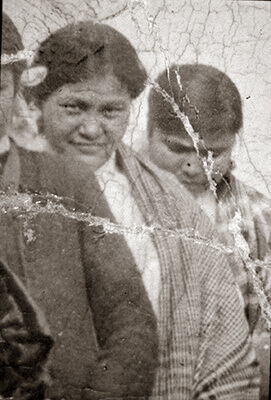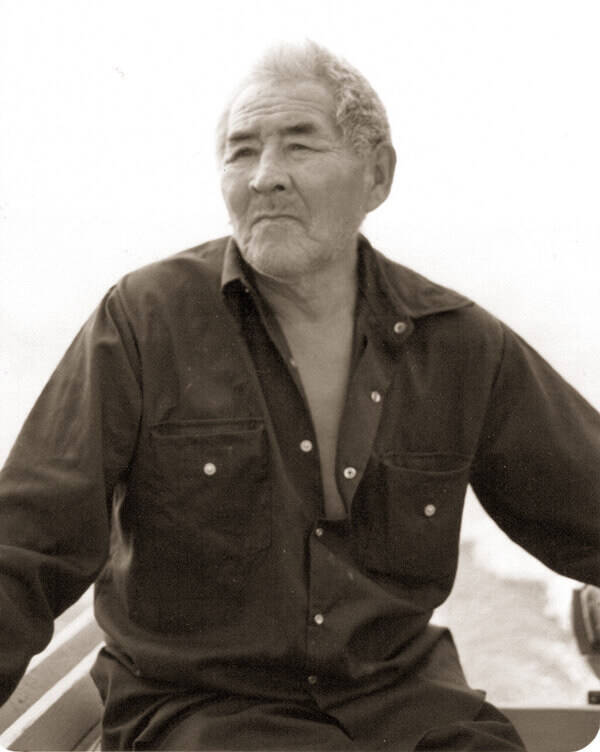EXCERPTS and AUDIO CLIP
We Remember the Coming of the White Man, Special Edition
Play a sample clip from the Audiobook.
-----
From the Preface, by Raymond Yakeleya.
The first edition of this book, We Remember the Coming of the White Man sold out very quickly, and speaking on behalf of the publisher and editors, this has made us all very happy. This demonstrates a strong and growing interest in the history of the Dene People.
Most of the copies from the first edition were sold directly to people in the North and, as well, through independent bookstores, notably The Yellowknife Book Cellar. The book received acclaim in many newspapers and media including CBC, The Rocky Mountain Outlook, Cabin Radio, and BC Bookworld. We were also happy to learn that many libraries throughout Canada and the USA purchased the book for their local readers. This cannot help but expand knowledge about the Dene People and, notably, Treaty 11’s dubious distinction in Canada’s history.
With this Special Edition, we are now in a position to expand our opinions about the signing of Treaty 11, which took place one hundred years ago in 1921. At the beginning of this book Walter Blondin and Sarah Stewart bring clarity to the history and fallout of the Treaty, but one thing I wish to emphasize is that it is important to know that Treaty 11 was initiated because of the oil contained in Norman Wells on the traditional lands of my family, the Blondin family.
When our Dene People signed Treaty 11 in 1921, there had been no negotiation because the Treaty translators were not able to translate the actual language used in the document. There was not enough time either for our People to consult with each other. Our Dene People were given a list that had been written up by bureaucrats declaring the demands of Treaty 11. They dictated to the Dene, “This is what we want. You have to agree, and sign it.” We did not know what these papers contained.
In the entire history of our People, we had never come across anything like that before. The government parties would stop in towns and villages along the Mackenzie River for one or two days and demand a signature. How can they demand something from People who cannot understand? That’s a crime. I have often said that Treaty 11 does not meet the threshold of being legal. In other words, when we make a treaty, it should be that you understand, I understand, and we agree. In this case, the Dene did not understand.
It was only through the urging of the Roman Catholic bishop in my hometown of Fort Norman, (Tulita), that the People signed the Treaty because they had faith in the Roman Catholic Church. I remember my grandfather saying that Bishop Breynat, who was the bishop of the Mackenzie diocese, worked for God and did not lie, steal, or cheat. Belief was that he had to be a completely honest man and so we put our faith in him. It turned out not to be that way. It was all about money and we feel the Catholic Church was in the pocketbook of the government and the Dene were their last concern.
I feel we should challenge Treaty 11 because there are many parts of it that are despicable. We still do not understand Treaty 11 and I think we have to look at it again from the Dene perspective. We are bound by that Treaty and we gave our word. We need to go through the Treaty point by point by point and see where we are at a hundred years later.
That all said there was some benefit of education that came with the Treaty and some health care but overall I have very little to praise. It was obvious the white man was not going to learn Dene so our People were trained in the English language. There was medical care, but there were also many diseases introduced like tuberculosis, measles, polio, and of course, the Spanish flu. Our People had no antibodies to fight these new sicknesses. When I made the film We Remember with Bill Stewart, which is included with this book, we found out that the Department of Indian Affairs cut back funding for medicines for Indigenous People. So rather than be a good partner and provide medical care, people died. The government was meant to be a partner who had concern for us but they didn’t really give a damn for us. We could not trust them.
The Department of Indian Affairs was also responsible for a lot of the other suffering our People went through, like the Residential School system and the Sixties Scoop. Their idea was to keep us just smart enough to be dumb. Thoughts were, “Don’t train the Indian kids much more than grade 3 because they are going to compete with the white man immigrant settlers coming in for jobs.”
From the Chapter, "The Sickness."

Elizabeth Yakeleya
In those days we didn’t know about TB. We didn’t know what it meant. I had twelve children but I only had two boys. The eldest learnt how to work but the second one always followed me. So I taught him how to snare and set fish nets.
He had been playing outside and when it was time for him to come in, he started bleeding from his nose. We took him to the hospital and the doctor said he was having a haemorrhage. He didn’t want to stay there and he cried but we had to leave him.
In the fall he said, “Mom, I want to go home with you.”
The doctor said, “I’m sorry. I thought he was going to get better but I don’t think he will live.”
I told him, “Even though he has TB, I will take my son and he can stay with me until his end.”
So we took him back. It was in March that he passed away. It was a beautiful morning and the sun was shining. He said, “Please take me to the window. I’ll see the sun rising.”
I kissed him and I had my tears.
“Mom Please don’t cry.”
That’s the last words he gave me.
I had twelve children, eight of them died.
When the Doctor came into the community, he examined many people and said they had TB. He sent many children away to hospital and it was a long, long time before they came back again.
When our children pass away it is a great sadness. Our Dear Lord helps us.
News of the North Story about this, March 18, 2020
From the Chapter, "Oil Discovery."
Joe Blondin
Even before the news came back about the sample my grandfather had sent out, the oil rush was on. That spring half of Canada was down there. People came with dog teams, packsacks, snowshoes. Even from as far away as Alaska.
Everybody tried to get a little cut out of this oil strike. It was staked clean below Sans Sault Rapids, 70 miles below Norman Wells and 55 miles above Fort Norman. They figured that if they had property, they would have something but it didn't turn out that way. Imperial Oil had leased the property first and the
people who had come in were just froze out.
The outsiders, the money men, knew what was going on but the local individual knew nothing. All [my neighbor] knew was that he'd get something out of it but he had nothing on paper. Well who knows about documents or regulations or having a title in those days? Everybody trusted everybody else and took a man's word of honor as the truth.
We had moved back to the mountains trapping. When we came back the Government had been in there and bulldozed all our houses down the bank and put up their own buildings. Our houses used to be where the transmitter is now.
My grandfather and my dad got free gas as long as they were alive. I got two cards for free gas and oil for two years and then they disqualified me.
Right now, Norman Wells is a white community. The Natives can't even pitch a tent there. I was born and raised there but all I can do is walk the streets. They are choking us little by little.
Now this is a great joke. Imperial Oil has got a magazine called Imperial Revue. I was reading in there how Mackenzie discovered the oil in 1700 and something. Mackenzie was never around that oil! The Blondins are the ones who discovered the oil. The natives found it and never got anything and that's the truth.
CBC Media coverage of this story, Dec. 20, 2010.
Elizabeth Yakeleya
Even before the news came back about the sample my grandfather had sent out, the oil rush was on. That spring half of Canada was down there. People came with dog teams, packsacks, snowshoes. Even from as far away as Alaska.
Everybody tried to get a little cut out of this oil strike. It was staked clean below Sans Sault Rapids, 70 miles below Norman Wells and 55 miles above Fort Norman. They figured that if they had property, they would have something but it didn't turn out that way. Imperial Oil had leased the property first and the people who had come in were just froze out.
The outsiders, the money men, knew what was going on but the local individual knew nothing. All Itsen* knew was that he'd get something out of it but he had nothing on paper. Well who knows about documents or regulations or having a title in those days? Everybody trusted everybody else and took a man's word of honor as the truth.
We had moved back to the mountains trapping. When we came back the Government had been in there and bulldozed all our houses down the bank and put up their own buildings. Our houses used to be where the transmitter is now.
My grandfather and my dad got free gas as long as they were alive. I got two cards for free gas and oil for two years and then they disqualified me.
Right now, Norman Wells is a white community. The Natives can't even pitch a tent there. I was born and raised there but all I can do is walk the streets. They are choking us little by little.
Now this is a great joke. Imperial Oil has got a magazine called Imperial Revue. I was reading in there how Mackenzie discovered the oil in 1700 and something. Mackenzie was never around that oil! The Blondins are the ones who discovered the oil. The natives found it and never got anything and that's the truth.

